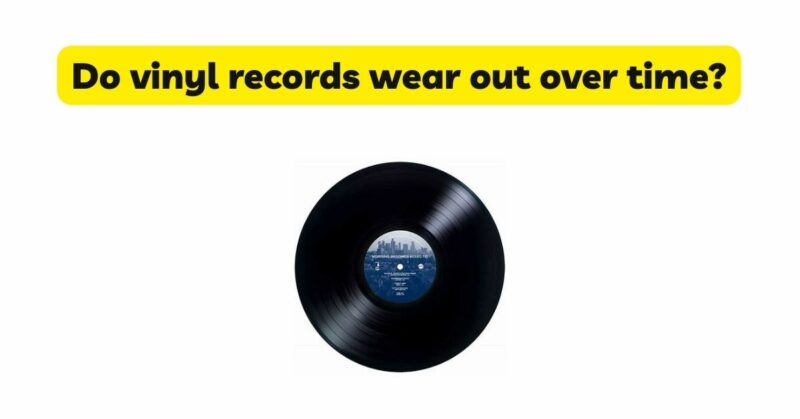Vinyl records have a special place in the hearts of music enthusiasts, offering a distinct listening experience and a touch of nostalgia. However, a common concern among vinyl lovers is whether vinyl records wear out over time. In this article, we will explore the factors that contribute to the wear and aging of vinyl records, including physical factors, environmental conditions, handling practices, and technological advancements. By understanding these elements, we can gain insights into the natural wear that occurs and learn how to preserve and prolong the lifespan of vinyl records.
- Composition of Vinyl: Vinyl records are made from polyvinyl chloride (PVC), a durable and resilient material. Vinyl’s composition gives it the ability to withstand repeated playback without significant wear. However, it is essential to recognize that vinyl is not immune to natural degradation processes over time.
- Physical Wear: Physical wear is a natural consequence of playing vinyl records. Each time a stylus or needle makes contact with the grooves, microscopic wear occurs. Over time, this wear can result in a gradual loss of sound quality and fidelity. However, it is important to note that with proper care and maintenance, the rate of wear can be minimized.
- Environmental Factors: Environmental conditions play a significant role in the wear and aging of vinyl records. Exposure to extreme temperatures, high humidity, direct sunlight, and rapid fluctuations in environmental conditions can accelerate the degradation process. These conditions can cause warping, mold growth, discoloration, and damage to the vinyl material. Proper storage in a controlled environment helps protect records from these detrimental factors.
- Frequency of Playback: The frequency of playback can affect the wear and aging of vinyl records. The more a record is played, the higher the potential for wear on the grooves. However, it is important to strike a balance between enjoying the records and preserving them. With proper care, occasional rotation of records, and careful stylus maintenance, the impact of frequent playback can be minimized.
- Handling Practices: Gentle and careful handling is crucial for preserving the lifespan of vinyl records. Fingerprints, dirt, and oils transferred during handling can accumulate on the surface and affect sound quality over time. By handling records by the edges and avoiding contact with the playing surface, the risk of wear and damage can be reduced. Proper storage in protective sleeves further safeguards against physical damage.
- Technological Advancements: Technological advancements in the production and playback of vinyl records have significantly reduced wear over time. Modern pressing techniques, improved vinyl formulations, and advancements in stylus materials and cartridge designs all contribute to increased durability and decreased wear. These advancements ensure that vinyl records can withstand extended periods of use without significant degradation.
- Lifespan and Individual Factors: The lifespan of a vinyl record is influenced by various factors, including the quality of the vinyl itself, the pressing techniques employed, the handling practices adopted, and the playback equipment used. While it is challenging to provide an exact timeframe for when a vinyl record will wear out, with proper care, vinyl records can last for decades or even longer.
- Preservation Efforts: Preservation efforts are essential for prolonging the lifespan of vinyl records. Regular cleaning using appropriate methods and tools, such as carbon fiber brushes or record cleaning machines, helps remove dust and debris that can affect sound quality and contribute to wear. Proper storage in a controlled environment, utilizing protective sleeves, and implementing gentle handling practices all contribute to preserving the condition of vinyl records.
Conclusion: Vinyl records, like any physical medium, undergo wear and aging over time. Physical wear from playback, environmental conditions, handling practices, and the frequency of use all contribute to the gradual degradation of vinyl records. However, with proper care, maintenance, and preservation efforts, the lifespan of vinyl records can be significantly extended.Vinyl records hold a special place in the world of music, offering a unique and immersive listening experience. While they may show signs of wear over time, their value and charm go beyond their physical condition. The imperfections and subtle nuances that develop with age can add character and authenticity to the listening experience.By adopting responsible handling practices, implementing proper storage and cleaning techniques, and staying mindful of environmental conditions, vinyl enthusiasts can enjoy their collections for many years. Technological advancements have also contributed to the durability of vinyl records, ensuring that they can withstand repeated playback without significant degradation.Ultimately, the lifespan of a vinyl record is influenced by various factors, and it is difficult to provide an exact timeframe for when a record will wear out. However, with love, care, and proper preservation, vinyl records can continue to bring joy, nostalgia, and a connection to the past for generations to come.Let us continue to appreciate the magic of vinyl records, embracing their imperfections as part of their unique journey. By preserving and caring for these cherished artifacts, we can ensure that the beauty and joy of vinyl records remain alive for years to come.


